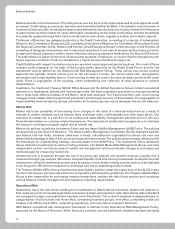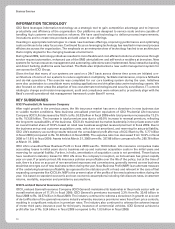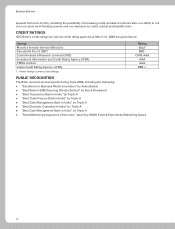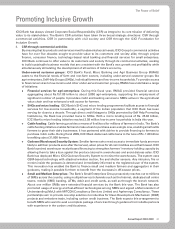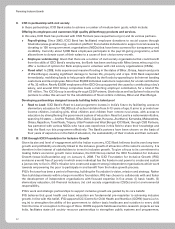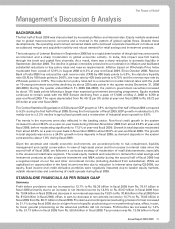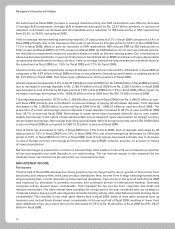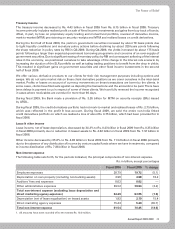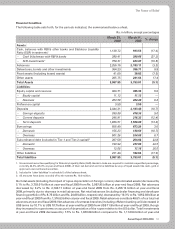ICICI Bank 2009 Annual Report Download - page 45
Download and view the complete annual report
Please find page 45 of the 2009 ICICI Bank annual report below. You can navigate through the pages in the report by either clicking on the pages listed below, or by using the keyword search tool below to find specific information within the annual report.
43Annual Report 2008-2009
The Power of Belief
and develops a variety of knowledge, policy and capacity building initiatives to address key sectoral gaps.
Throughout, the focus is on generating and translating strategies with the greatest potential for securing
large-scale and sustainable improvements in child survival and development in India.
IFIG also supports ICICI Centre for Elementary Education (ICEE) (www.icee.org.in), an inter-disciplinary
organisation that works to strengthen the ability of the government to provide high quality education to
every child from pre-school through elementary school. ICEE seeks to improve teacher performance,
advance curricular reform, build a discourse on education through research and support the development
of elementary education as an academic discipline in India. It provides financial and resource support to
NGOs, and collaborates with NGOs, state governments and academic institutions to deepen and broaden
institutional reform in India’s state system of elementary education.
While healthy and educated individuals have the capacity to transform their lives, IFIG believes that their ability
to do so depends on the quality of their access to transformative tools such as finance. Financial services
enable individuals and enterprises to smooth consumption and allocate resources most productively, for
example, by allowing them to better manage risk (e.g. insurance) and take advantage of future opportunities
(e.g. saving today to build capital for tomorrow). A well-functioning financial system and access to financial
services can also enable households to engage with the larger economy by providing payment and settlement
systems (e.g. electronic payment systems) and by transmitting price information through the economy.
Access to comprehensive financial services is therefore an essential part of the development process and
inclusive growth.
Through its support to IFMR Trust Advocacy Unit (ITAU) (www.ifmrtrust.co.in/advocacy), IFIG works to ensure
that every individual and every enterprise in India has complete access to financial services. Since its creation
in 2008, the IFMR Trust Advocacy Unit team has applied its focus and resources to initiate research projects,
provide support to new institutions, establish partnerships, and document and disseminate knowledge. Its
central intent has been to become a creative and strategic group that can deploy its ideas, energies and
funding to create leveraged impact on the state of access and use of high quality financial services for the
financially excluded in India.
For the Indian growth process to be truly inclusive, health, education and access to complete financial markets
are necessary but not sufficient conditions. Ensuring that every individual has the freedom and the power
to create and sustain a just society and thereby benefit from the Indian growth process requires additional
efforts on the part of civil society and policymakers. Grassroots organisations and regulatory infrastructure,
for example, must be strengthened to ensure that the market does not exploit marginalised sectors of the
population or the environment.
Through its support to CSO Partners, IFIG seeks to support social change and build a defence against
exploitation of all kinds by strengthening CSOs. CSO Partners works towards inclusive growth by strengthening
CSOs and forging key partnerships for them from its expanding network of support partners and contributors,
including corporate groups, governments, and individuals. CSO Partners aims to equip CSOs with financial and
human resources to achieve high standards of quality and efficiency by mobilising resources and facilitating
support services for CSOs.
Through Environmentally Sustainable Finance (ESF) (www.ifmr.ac.in/cdf/esf.htm), an initiative at the Centre
for Development Finance, IFIG supports policy and regulations that ensure that growth and development
processes proceed in an environmentally sustainable manner. ESF focuses on research and action to inform
environmental policymaking and implementation, integrate environmental sustainability into development
initiatives, and support scalable commercial and non-profit interventions to make India’s economy more
environmentally sustainable from the bottom up.
IFIG provides active support and mentorship to these five partners – a strategy that it believes will build
knowledge and specialisation in each field and ensure long-term impact. To achieve maximum impact,
IFIG’s strategic partners in turn work closely with additional partners at the community level, enhancing
knowledge, building networks and advocating for changes necessary to catalyse inclusive growth and create
a just society.





